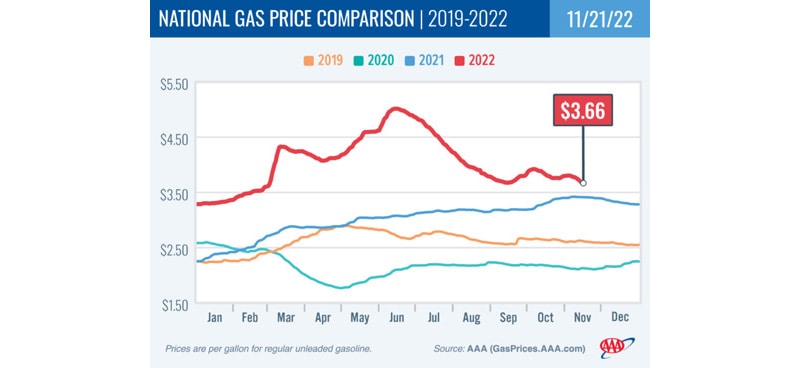View the nation’s top 10 largest weekly decreases and top 10 least expensive markets as drivers hit the road for Thanksgiving travel
Washington, D.C.—Drivers fueling up ahead of Thanksgiving will benefit from falling pump prices, as the national average for a gallon of gasoline dropped 11 cents in the past week to $3.66. That’s the good news. Unfortunately, while lower, this week will see the highest Thanksgiving national average price since AAA started keeping records in 2000.
“The national average has fallen sharply since the June peak of nearly $5.02,” said Andrew Gross, AAA spokesperson. “But this Thanksgiving will be about 20 cents higher than a year ago, and a dollar more per gallon than a pre-pandemic 2019. However, we can be thankful that gas prices are moving in the right direction for now.”
According to data from the Energy Information Administration (EIA), gas demand fell from 9.01 million to 8.74 million b/d last week. Meanwhile, total domestic gasoline stocks rose by nearly 2.2 million bbl to 207.9 million bbl. Increasing supply and fewer drivers fueling up have pushed pump prices lower. As demand remains low and stocks grow, drivers will likely see pump prices dip through the Thanksgiving holiday.
Today’s national average of $3.66 is 16 cents less than a month ago and 26 cents more than a year ago.
Quick Stats
The nation’s top 10 largest weekly decreases: Wisconsin (−23 cents), Michigan (−23 cents), Indiana (−19 cents), California (−18 cents), Ohio (−17 cents), Illinois (−16 cents), Delaware (−16 cents), Oregon (−16 cents), Washington (−13 cents) and Nevada (−13 cents).
The nation’s top 10 least expensive markets: Texas ($2.99), Georgia ($3.10), Mississippi ($3.12), Arkansas ($3.13), Louisiana ($3.17), Oklahoma ($3.18), Tennessee ($3.20), Alabama ($3.22), South Carolina ($3.22) and Missouri ($3.24).
Oil Market Dynamics
At the close of Friday’s formal trading session, WTI decreased by $1.56 to settle at $80.08. Crude prices dropped last week despite the EIA reporting that total domestic commercial crude stocks fell dramatically by 5.4 million bbl. Instead, prices declined because the market is concerned that oil demand could decrease due to growing economic concerns. For this week, persistent concerns that economic growth might stall or reverse course could push prices lower. If crude demand declines, prices will likely follow suit.










Comments are closed.